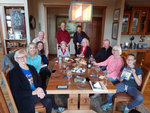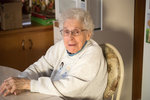

Although she didn’t want an obituary or a funeral, Helen Holloway would have enjoyed herself Friday evening when her friends gathered at the rural Chehalis home of Kevin and Debbie Schinnell to remember a remarkable woman.
I met Helen 16 years ago, when Edna Fund gathered a group of volunteers with the goal of honoring local men and women (Rosie the Riveters) who worked at the Boeing Co.’s branch plant in Chehalis. We visited Boeing’s archives in Bellevue and mailed booklets asking Rosies and the guys to share their memories of the World War II years.
When Helen returned her booklet, it was filled in fine writing with fabulous stories of her hardscrabble life in a third-floor Chicago apartment and noisy 10-hour-a-night jobs as a rifle inspector at Rock-Ola Manufacturing from 1943 to 1944; as an inspector of aircraft parts at Bendix Aviation from March to November 1944; and as a Magna-Flux operator and inspector at Dodge from December 1944 to May 1945. She described Magna-Fluxing as “a modern dance done rapidly … almost comical to watch.” She test-fired .30-caliber carbines and shared how at Bendix, a drill press caught a woman’s long hair and scalped her. She died within seconds. That’s why Rosies wore the bandanas around their heads.
Later, I interviewed her to gather more details of her life, which she readily shared for the book “Life on the Home Front: Stories of those who worked, waited, and worried during WWII,” a volunteer undertaking I compiled and edited as part of the Rosie celebration.
She shared how after her Rock-Ola gun contract ended, she walked down the street, lunch in hand, and found another job soldering wires to parts for radios in tanks. Two hours later, a man holding a microphone told everyone to gather outside as they were “on strike.” Helen picked up her lunch and, eating as she walked down the street, found a job at Bendix Aviation. She finished her lunch and started her new job.
“I was so surprised that anyone would strike!” she recalled. “Jobs went begging and we were also vital to the war effort. I would not strike.”
Helen wrote about the attack on Pearl Harbor, rationing of shoes and gasoline, and collection of rubber, paper, and metal for the war effort. She was a patriotic woman waiting for the return of her fiancé who was fighting in the Pacific.
“We looked forward to each new day with hope that the war might end,” wrote Helen, a strong supporter of the Veterans Memorial Museum. “As I look back on those days it seems like all we did was prayed, work and write letters.”
After she married her husband, Merle Foote, January 1, 1946, Helen moved to Kosmos, where she worked as a “flunky” in a timber camp’s cookhouse. (Kosmos was buried beneath Riffe Lake when Tacoma Power built the Mossyrock Dam in 1968.) Merle and Helen had a son and a daughter. Helen outlived three husbands, and the last few years, she often asked why God was keeping her alive.
Kahle Jennings, who retired from the Centralia Public Works Department, met Helen after she complained about work the city had done near her home. While the driveway was fine, he agreed that her deck needed repairs from the work. After he retired, he sought bids for the job to keep his promise to her. A friendship flourished, especially after his mother passed away. He said Friday that God brought Helen into his life to teach him to have a servant’s heart.
Ron Burger, of Chehalis, a retired financial advisor who sweat bullets before calling Helen to share poor investment news, described her as “friendly, funny and feisty.”
Three of the original volunteer committee members attended the informal gathering — Fund, Peter Lahmann, and me. I picked up another Rosie the Riveter, Doris Bier of Chehalis, who shared her experiences as a 16-year-old putting together Jeep axles at the Mount Rainier Ordnance Depot near Fort Lewis during WWII. Her stories are also featured in “Life on the Home Front,” which is available at the Lewis County Historical Museum, Veterans Memorial Museum and Book ’n’ Brush.
Robin Murphy and Cynthia Payne, who work with Washington Women in Trades and featured Lewis County Rosie the Riveters on a 2014 calendar, drove down from Seattle for the informal memorial.
After we honored the Rosies at Centralia’s Summerfest in 2005, I delivered books to people who had contributed memories. At a home east of Chehalis, I entered a kitchen and handed the book to the woman who said, “You should have done this earlier.”
She’s right. We should have, but I’m so glad we did what we did to honor these women and men who worked on the home front to help the Allies prevail during World War II. Their lives, their stories and their friendships have blessed us so much in the ensuing years, even though it’s hard to say goodbye.
So often it seems society discards elderly men and women, the people who worked hard to shape the world we enjoy today, part of the Greatest Generation who have been shuffled into nursing homes and care centers. But they still have so much to offer. Stories. Memories. Recollections. History. Love. Friendship.
Take time to listen. You’ll never regret it. And consider recording the conversation to preserve that piece of history they lived.
•••
Julie McDonald, a personal historian from Toledo, may be reached at memoirs@chaptersoflife.com.